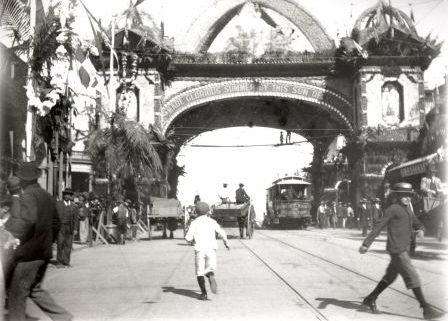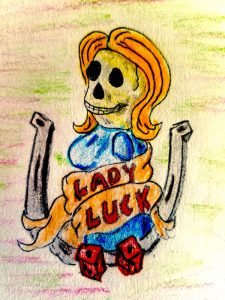The rules were simple. Write a story about the above photograph, using exactly 200 words, including the title. Not 201 or 199. Exactly 200 words.
Each story needed an original title and it was mandatory that the image be the main subject of the story. We offered no clues as to the subject matter of the photo or where it was taken. That, we left to the imaginations of the authors.
Stories then began to pour into our mailbox, were screened (words counted, etc.), and the top 14 tales were delivered to bestselling author Heather Graham for final judging. Here are her top picks, starting with the the winning story penned by Ry Brooks.
First-Place Winner
ASHES
By Ry Brooks
Nothing of the warehouse remained but its spindly scorched bones. To Sullivan, determining the cause seemed impossible. Flammable chemicals, stored in plastic barrels, had fueled the flames to unimaginable temperatures more like cremation than ordinary fire.
Arson? But the building was underinsured, and the owners had no motive. As he probed among the detritus, he heard a muted wailing. Sully moved in the direction of the sound, which came from under a scalded sheet of metal roofing. Gently lifting the obstruction, he discovered a small brown puppy among some old rags, singed but alive. He bent to wrap it in his scarf, and at that very moment, one of the charred uprights crashed down, right where he had stood moments before.
Startled, he squatted down to gather his wits and that is when he noticed the rags also covered a body. Apparently it was a homeless person, who perhaps had made a campfire for warmth. When the flames got out of control, his instinct had been to shield the little dog with his own body, sacrificing himself for another.
The dog squirmed, and Sullivan hugged the puppy close, whose life had been spared and had then saved his own.
Second-Place Winner
THE FALLOUT
By Chelle Martin
It had been a beautiful day full of warmth and sunshine. Family and friends were jumping about, unaware of any danger. But the world as we knew it came crashing down in an instant when a cold, dark mist fell upon us with a powerfully pungent, yet sweet odor.
Tranquility warped into pandemonium as families scrambled for higher ground or desperately burrowed for shelter.
The cloud seemed to last forever. Once it had lifted, our surroundings appeared black and white from the dust that had settled. My comrades who had been directly hit, lie dead and dying around me. I coughed and staggered onward, searching for other survivors.
One, two, we gathered together and moved on to a drier place. Would we survive? Sadly, the youngest and oldest were most affected by the onslaught. The chemicals were just too strong for their systems to ward off.
The ground shook violently beneath our feet, but we clung to the uprights around us for balance.
A large creature approached and spoke in a strange language as flood waters slowly began to rise. “Hold still and be a good boy, Rex. This flea and tick bath will finish off any survivors.”
Third-Place Winner
NURSING YOUR DATE
By Teela Davis
What an awful, boring, insufferable first date. Why did she still do these?
The movie was tolerable, but now a walk? She huffed, and not just a walk, a walk to the ‘haunted factory’. Did the creepy romantic thing ever really work out for guys? In all honestly, she just wanted dessert, and sleep!
“So, you know the legends here?”
“What, vengeful ghosts?” She barked a laugh, already rolling her eyes.
“Hah, not ghosts,” he grinned, dropping her hand once inside the crumbling monolith.
Relieved, she wiped her palm on her skirt, why was he so sweaty?
“Actually, there is a long list of unsolved murders here.” His cold tone made her take a step back, almost causing her to trip on debris.
“Oh?” Her hesitation made him nod. A knife flashed in his hand and she met his gaze as he advanced closer. Ugh, how typical…
“Yup, and I want to add to it.”
“Oh,” she chuckled darkly, done playing, “don’t worry, you will.” He stepped closer but paused, clearly confused.
“Wait, wha-” The sentence died in his throat just as she launched herself at him, teeth tearing into his flesh.
Finally, she laughed, dessert!
The following finalists are in no particular order …
THIS IS IT
By A.R. Kennedy
They walked up to the destroyed building in silence. Each wondered how they would find the missing woman’s pendant in the wreckage.
The tip had come in that the killer had marked the woman’s gravesite with her four leaf clover pendant. She had worn it everyday since her fifteenth birthday. For luck, she told people who asked.
In silence, they traversed the site in search of that pendant. Lisa fell, tripping over one of the many obstacles in her path. She slowly got up.
“You alright, Lisa?” her partner asked.
She put her hands in her pockets and shrugged. “Could be worse.”
Her partner, Joel, knew she was right.
Twenty minutes later, they finished their inspection.
“Well, we didn’t find it. Did you think we would?” Lisa asked.
Joel paused, wanting to answer honestly. “I didn’t think I would find it.”
“I guess this is it, Joel,” Lisa said as she headed to their car.
Joel nodded because he knew it was. He pulled his gun and motioned for her to take her hands out of her pockets.
The tarnished four leaf clover hung from her fingers.
“You’re right,” Joel said. “This is it.”
BABY SHOWER
By Cassy Muronaka
“Oh, getting coffee? Me too, Jeannie?” asked Bob, junior salesman, giving his ceramic mug and winning smile to Jean, senior saleswoman.
Taking it, she immediately was flagged over by her boss, Jerry, who announced she was not getting her anticipated promotion, despite being number one in sales.
“Politics, you know. New owner, Porter, canned it.”
Then Jerry asked her to work late again.
At noon, Jean wrote on the company’s internal message group, “Girls: time to meet at the picnic tables. Surprise baby shower, Brenda! No boys allowed!”
The tables were a fair distance from the building, enough for the women to comfortably inhale plenty of champagne with the potluck lunch. Jean wasn’t the only woman who needed relaxation.
When Brenda opened the baby gifts, she said, “You are all so generous.” She hugged Jean. “I know you’re responsible for organizing all of this. Thank you so much.”
It was then that the building exploded and caught fire. As Jean watched the brand-new sign reading “Porter Industrial and Mining Explosives” fly off the building and into the parking lot, she smiled at Brenda and said, “Yes, I’ve been planning it for a long time.”
CLOSE THE DOOR
By Pamela Raymond
“Aunt Lydia has a melancholy side. I’ll give her that. But this?” My sister held a black and white photo of a charred lot, encased in an ornately fashioned wrought iron frame.
“Why would Aunt Lydia give a 10 year old this grisly photo?” My sister was not amused.
“Mommy. Hang it over there!” The little girl crawled on to her bed and motioned above the headboard. “The picture will like it here.”
“Pictures don’t care where they hang,” Katherine muttered.
My phone rang two weeks later. Jumbled, shaken, Katherine spoke so quickly, I could barely understand her. “My daughter. She keeps. The picture. CLOSE THE DOOR!” The line went dead.
By the time I got to the house, a smoking pile of embers existed where a home used to be. I found Katherine sitting in an ambulance. She mumbled over and over, “That picture.”
In the chaos, the little girl wandered to me.
She pulled the picture from her soot smeared robe. “Mommy wanted me to close the door and leave the picture in the fire. Mommy should have been nicer to the picture.”
The look in her eyes chilled me to the bone.
UTOPIA, CALIFORNIA
By Phoef Sutton
There is no crime in Utopia anymore.
Officer Mingus drives the streets of this small California town like she has a hundred times before. Her police dog Vlad rides shotgun. Vlad is trained to sniff out meth and heroine and other illegal drugs. But there are no drugs now.
Utopia is peaceful.
Officer Mingus misses the turn onto Grevelia Street since there are no road signs. No landmarks. Only the occasional blackened chimney. The wildfire that ripped through town two weeks ago had wiped it from the face of the earth, leaving nearly ninety dead and hundreds more still missing.
Turning into a driveway, Mingus stops the patrol car and gets out. Vlad goes rooting around, reveling in the smells of destruction and incineration, while Mingus searches through the ruins of her own house. She had been there with her husband when the fire alarm first sounded. She had rushed out.
Brian had stayed behind.
She finds her bedroom and digs through the debris, until she uncovers Brian’s skull. Shaking it, a small caliber bullet falls out. She tosses it away and crushes the skull with the butt of her gun.
She is free now. Fire cleanses everything.
THE BRIDGE
By Ferd Crotte
My old knees shake as I pick my way through the loose rubble, struggling for balance and understanding. I find an unsteady purchase and pause to curse the utter devastation before me.
I repeat the calculation — seventy-four years since the bridge last stood. Seventy-four years since I felt my father’s hand, holding mine as we walked the bridge’s long expanse. Seventy-four years since the bomb.
The crumbled city was dead to radiation, and access was forbidden. Now it’s open, though no less dead. A primal scream explodes from me, but no one hears. The ruins are silent. The rage is my own.
An unwelcome wind scatters a flume of ashes by my feet. Was that my father? The ashes dissipate, and again he leaves me.
I’m told the bridge was beautiful, and my father helped build it with his own hands. I’m told he was a peaceful man. Am I my father’s son?
I take a wary step into the rubble, then another. It’s why I came — to cross this broken bridge of time. I try to remember the feeling of his gentle hand. I need to find my father’s peace.
FUMES
By Lynn Long
“Willie Nickels died today in the gas chamber…” Click.
Gordon Chandler twisted the radio knob in his Plymouth, sucked the life from his Chesterfield and tossed the butt.
“I hope the bastard’s lungs burned just like that poor girl’s did,” Gordo exclaimed to the roadrunner perched on the warehouse ruins. The carbonized columns stood like trees in a charred forest. Uninterested, the bird vamoosed. He rolled his window shut.
Gordo knew every detail. He cast the tire prints. He found the dented, orange gas can. He interviewed neighbors who recognized the can. He discovered the blackened remains in the ashes. The detective had done everything but strap Nickels down and drop the pill.
Nickels deserved to drown in a cyanide bath. The onetime pimp ran the city. Nothing happened without his permission. Graves were full of people who didn’t get the message. No one could touch him. Few tried.
Gordo tried. He poured the plaster in Nickels’ driveway. He planted the gas can. He flicked his Chesterfield into the gasoline spread around the abandoned warehouse, not knowing a runaway had sought refuge there.
Exhaust fumes whispered through a garden hose, poisoning the air. His eyelids fluttered.
“If only…”
AFTERMATH
By Elizabeth Haines
Despite the hospital slippers, my feet are freezing. I wait for the nurse, a thin cotton shroud, the blue and white print bleached and faded, tied behind my neck. After a moment, I realize the music playing faintly in the background is a Beatles’ song, twisted into a requiem. I used to dance to this song, barefoot in a forest that no longer exists.
If we’d heeded the warnings, we would have been deep underground when the bombs came, but the woodland flowers were blooming and the alarms had always been false before now. We were surprised when the high whistling sound surrounded us, coming from everywhere and nowhere. We survived, if we can call it that, because we weren’t anywhere near ground zero where the trees were burnt to sticks. Once we regained consciousness in the hospital, we learned our fate. The news reported we “woke up dead.”
The nurse, outfitted from head to toe in a disposable covering, comes in to explain my options. I remember seeing the drone footage of the remaining trees. They looked like black obelisks in a graveyard. My feet are still freezing. I tell her I want to be cremated.
THE TELL
By Lynette Eason
Moonlight touched the steel post at the edge of the bombed ruins. This was his playground and he’d lured Karly here, incensed by her televised scorn.
“Come alone,” he’d texted. “Or she dies.”
She spotted a dark stain at the base of the post. And the next—a matching blemish. Each one the same. Representing every victim he’d suspended before using the blade’s edge to spill their life-blood.
Nausea churned. Neck hairs spiked.
From somewhere, he watched.
Her weapon offered minuscule comfort.
A footstep behind her.
She spun. “You?” Her sister’s fiancé? “Why?”
“I followed my calling.” The knife gleamed its intent. “I released their evil.”
She lifted the gun. He froze. “Shoot me and you’ll never see your sister again.”
“She’s alive?”
“Yes. I’ll show you.” He started towards her, fingers flexing on the handle.
Karly fired. Once. Twice. Again.
He fell, choking, gasping.
She stepped closer. Very little blood stained his shirt. Good. His evil would go with him. “You lick your lips when you lie.”
She turned to go.
A hand clamped around her ankle.
Terror surged. Realization hit.
Very little blood.
Because he’d worn a vest.
HELP WANTED
By Lisa Wheelan
Leonard helped the old woman across the pile of rubble.
“Are you sure this is the place Mrs. G?”
“Yes Leonard”
“But it’s just a busted-up building.”
She pointed to a far corner with her crooked finger “over there.”
Dementiaville, here we come, Leonard thought, time for a new job.
They made their way over crumbled concrete and broken steel. He found a spot where she could sit, laid his uniform jacked over it and eased her down.
“What are we looking for Mrs. G?”
“You’ll know when you find it. Please begin.” She gestured.
Leonard began moving chunks of concrete to the side.
“How long have you worked for me Leonard?”
“Almost ten years.
“We’ve been through a lot haven’t we”
“Yes, Mrs. G.”
“You know a lot of my secrets, don’t you?”
“I keep my mouth shut.”
“I’m sure you will.” said Mrs. G.
“How much more do” …. Leonard stopped.
“You find something?”
“It’s a jacket…like mine. I think it’s a body.”
“That would be John, he left my employment ten years ago.”
Leonard’s last thought…such a big gun for such a feeble old wom.…
ESCAPED MEMORIES
By Tammie Fickas
Dirt and concrete dust puffed as Edward Maximillian, Max to his friends, not that he had ever had any, shuffled through the ruins. Years had lumbered on since the night a raging inferno raced through the Emsdon Home for Boys, destroying the building. The hateful place was anything but home. That night played in his mind like an old movie. The thrill of the employee’s fear filled him, excited him. It always had.
Paper caught in the rubble, fluttered with the breeze. Max’s own face stared back from the poster.
Escaped prisoner.
Armed and dangerous.
You will never amount to anything, Edward Maximillian.
Max leaned against a rough, charred wall stud. Death lingered here like the spirit of the headmaster who never made it out of the building alive. Max could almost smell it. A misshapen sneer stretched his lips. Oh, how he hated that man who made his life miserable. Satisfaction danced in his heart as he relished his revenge.
Who will never amount to anything?
Not far off, police sirens wailed through the night. Max took a long, last look, then loped toward the thick forest, once again disappearing like a dream at morning’s first light.
HANDS
By K.P. Gresham
She said the bastard was buried beneath the support beam. But which one?
Then I remembered.
That first night. Laughing, he’d ripped away our virginity and put his hands places we didn’t even know we possessed.
With adulthood, payback time arrived. As always, I took the lead. We worked fast. Her job was to get the account passwords. My job was to kill him. I torched the warehouse while she buried him.
We both came through. After he was dead, her codes and keys got us into the house, the study, and the wall-mounted lockbox.
Then we saw the little opening beneath the safe’s keypad. It required a hand print.
So, here I am, back at the burned out warehouse—his favorite hunting ground. Shovel and saw in hand, I walk over fallen trusses and crumbled cement blocks to where the dumpsters had once stood—the first hiding place where we’d been cornered. That horrible first night.
Sweat pours over me as I unearth the body. His face is finally as ugly as his soul. I uproot his arms and begin to saw below the elbow.
“Time to put your hands to good use, Daddy.”
2019 Golden Donut Contest image – Mare Island Naval Shipyard – Vallejo, California.

The Mare Island shipyard was the first U.S. Navy base established on the Pacific Coast. The base was purchased by the Navy in 1853 and remained open until it officially closed all operations in 1996. It is now a National Historic Landmark.






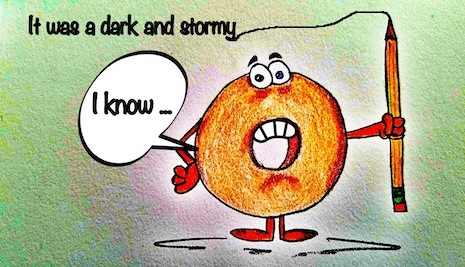













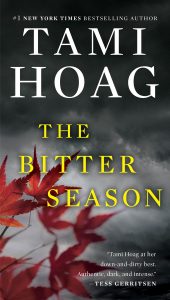





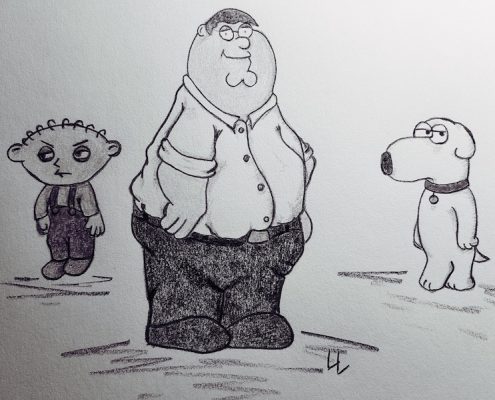 One or two are all that’s needed. Any more and the dialog could become confusing. Besides, too many names eats up word count like watching videos on a crappy wireless data plan chews up precious minutes. The same is true with dialog. A family of twelve all talking to a homicide detective who’s barking out orders to a 10-person CSI team along with four other detectives could wipe out the entire word count in a single, unimportant scene.
One or two are all that’s needed. Any more and the dialog could become confusing. Besides, too many names eats up word count like watching videos on a crappy wireless data plan chews up precious minutes. The same is true with dialog. A family of twelve all talking to a homicide detective who’s barking out orders to a 10-person CSI team along with four other detectives could wipe out the entire word count in a single, unimportant scene. SHOW, SHOW, SHOW!
SHOW, SHOW, SHOW! Edit
Edit


